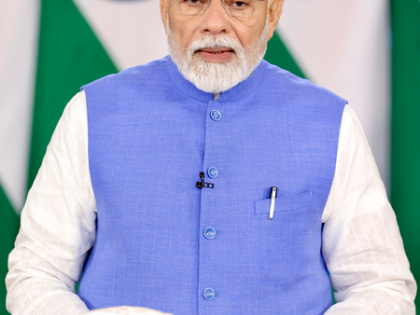High time to build infrastructure that stands against tide, says PM Modi at Nice summit
By IANS | Updated: June 7, 2025 16:48 IST2025-06-07T16:43:30+5:302025-06-07T16:48:25+5:30
Nice (France), June 7 Prime Minister Narendra Modi on Saturday gave an alarming call by saying coastal regions ...

High time to build infrastructure that stands against tide, says PM Modi at Nice summit
Nice (France), June 7 Prime Minister Narendra Modi on Saturday gave an alarming call by saying coastal regions and islands are at great risk due to disasters and climate change, and it's high time to build infrastructure that stands firm against the tide.
Speaking virtually at the seventh International Conference on Disaster Resilient Infrastructure (ICDRI) in the run-up to the third UN Ocean Conference (UNOC3) in the southern French city of Nice, PM Modi said: "Coastal regions and islands are at great risk due to disasters and climate change. Let us build infrastructure that stands firm against time and tide, creating a stronger, more resilient future for all."
The ICDRI conference is focusing on strengthening disaster-resilient infrastructure in coastal regions and Small Island Developing States (SIDS).
With approximately 37 per cent of the global population residing within 100 km of the coast, contributing around $1.5 trillion to the annual global GDP, and 90 per cent of global goods transported by sea, strengthening coastal resilience is now a global priority.
Bringing together over 350 delegates, ICDRI is addressing three key pillars to drive resilience efforts: access to finance, data, technology and early warning systems, and codes and standards.
Speaking on the occasion virtually, Mohamed Irfaan Ali, President of Guyana, said, "We need a global push to unlock the resources required to bolster climate adaptation for the vulnerable regions, especially for small islands and low-lying coastal areas. For us, climate-resilient infrastructure is a question of survival."
David WR, Adeang MP, President of the Republic of Nauru, said, "This conference is an opportunity to move from dialogue to delivery. Let us work together to ensure no nation and no community is left behind in building a future that is not only resilient but fair, inclusive, and sustainable."
Gaston Browne, Prime Minister of Antigua and Barbuda, shared, "Resilient infrastructure is not just a policy option - it is a necessity for survival. We believe that resilience begins not at the shoreline but in the minds and systems we build."
Alix Didier Fils-Aime, Prime Minister of Haiti, stated, "We believe resilience is not a luxury but a moral and political imperative. Together, through solidarity and shared commitment, we can lay the foundation for a more secure, more resilient, and just future for all."
Welcoming the audience, New Delhi-headquartered Coalition for Disaster Resilient Infrastructure (CDRI) Director General Amit Prothi said, "Coastal resilience is vital for protecting lives and economies. ICDRI 2025 unites global voices to inform action for vulnerable coastal communities and SIDS. Through our IRIS programme, we are supporting 24 projects across 25 SIDS, driving sustainable and inclusive infrastructure development."
At ICDRI, the 54-member global coalition has reaffirmed its commitment to advancing climate and disaster-resilient infrastructure across Africa.
Other announcements include the awarding of research grants for 53 projects spanning 21 countries, as well as a call to action for accelerating infrastructure resilience in small island nations, emphasising the urgent need for global collaboration and investment.
In an exclusive interview with IANS, Prothi said that in coastal regions, rising temperatures have increased the frequency and intensity of heavy precipitation events, such as hurricanes, cyclones, and flooding; and extreme storms and sea-level rise are resulting in greater coastal flooding, storm surges, and coastal erosion.
He believes there is an increasing emphasis on mobilising private finance for disaster risk reduction and enhancing infrastructure resilience, especially in developing countries and SIDS.
"CDRI's Global Infrastructure Resilience report highlights that most new infrastructure investments over the next 30 years will occur in low- and middle-income countries, necessitating resilient assets to protect communities and promote growth," he said.
The CDRI, launched in 2019 by PM Modi at the UN Climate Action Summit, is an international organisation set up by the government of India to provide leadership on the topic of disaster resilience.
India serves as the Permanent Co-Chair, while France holds the Rotational Co-Chair position from April 2024 to March 2026, following previous co-chairs, Britain and the US.
CDRI's initiatives prioritise resilient infrastructure and services that are vital for socio-economic growth, including health, transport, power, and telecommunications.
Of particular focus are high-risk geographies, including coastal, mountainous, urban, and SIDS. Prothi says infrastructure in SIDS is at much greater risk compared to other countries.
When asked how far CDRI can support them, he told IANS, "SIDS are highly vulnerable to extreme weather events that can overwhelm infrastructure and disrupt essential services like transport, electricity, and water. These disruptions, in turn, impact livelihoods, public health, and economic stability. To address these risks, the coalition’s IRIS initiative, funded by India, Australia, the UK, and the EU, supports SIDS with technical assistance, capacity building, and knowledge resources."
Disclaimer: This post has been auto-published from an agency feed without any modifications to the text and has not been reviewed by an editor
Open in app